2024 Local food report
Learn about the people, businesses and organizations successfully working to strengthen Ontario’s local food economy.
Minister’s message
Without a doubt, the best part of being the Minister of Agriculture, Food and Rural Affairs is getting to work shoulder-to-shoulder with Ontario’s hardworking farmers — and this year, during Local Food week from June 3 to 9, we are shining a spotlight on the incredible people who grow our food. This is a unique opportunity for Ontarians to celebrate the people behind the products that we all know and love. As minister, I also have the pleasure of launching the annual local food report, where you can learn about all the good things grown, harvested and made in Ontario!
This year we are using Local Food Week and the local food report to recognize and thank the people behind the foods we eat every day. Ontario’s agriculture and food industry employs more than 836,000 people across the province — representing one in 10 jobs. This includes Ontario farmers, who grow more than 200 commodities on over 48,000 farms; over 54,000 food retailers and food service businesses; and more than 4,900 food and beverage businesses who manufacture and process 42% of Canada’s food and beverages. Ontario’s agriculture and food industry is an economic powerhouse, and farmers and people across the local food supply chain are at the heart of it all.
From meat proteins and dairy to fresh vegetables and fruit, fish and ice cream to honey and maple syrup and fresh baked goods, and so many more foods and beverages in between, Ontarians have access to incredible local food every day of the year. And we know that when we choose Ontario products, we are supporting our fellow Ontarians and strengthening our communities, our regions, and our province.
We can take great pride in knowing Ontario food is not only enjoyed here at home but is also in demand across Canada, North America, and around the world. I want to congratulate Ontario farmers, food processors and everyone across the local food supply chain for all their hard work, 365 days a year. Their efforts are helping us achieve the goals in the Grow Ontario Strategy. Ontario’s agri-food industry’s contribution to the provincial GDP and the value of Ontario’s agriculture and food exports have all climbed since the launch of the strategy. We are working to help farmers as well as food and beverage processors and manufacturers increase the production of food grown and prepared in Ontario by 30% by 2032 by supporting research and innovation, helping businesses invest in new technologies, and promoting careers in the agriculture and food industry. We are actively engaged and determined to establish Ontario’s agriculture and food industry as one of the best in the world.
To kick off Local Food Week, I invite you to watch my video and then get creative and find fun ways to celebrate the people who grow, make, buy and prepare the freshest, most delicious food in the world.
Lisa M. Thompson
Minister of Agriculture, Food and Rural Affairs
Boosting local food literacy in Ontario
We know that affordability is a focus for consumers in Ontario. Factors like production or fuel costs and changes to the Canadian dollar exchange rate, as well as distribution and market supply all contribute to the cost of grocery staples like bread and milk.
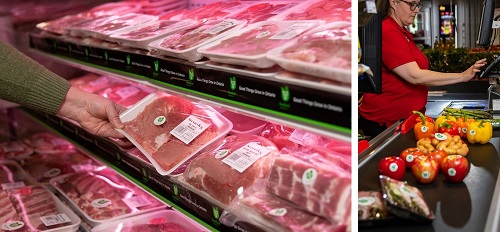
According to Foodland Ontario research, consumers are motivated by several different factors when purchasing local food. While price is often the focus, consumers identified other factors like freshness, quality, food safety, and supporting farmers within their communities as reasons why they choose to buy locally grown and made food. Local fruits and vegetables are often tastier as they are picked during their peak of freshness and can be less expensive than imports. For example, Ontario asparagus is such an anticipated local vegetable and spring field crop that many retailers don’t stock imported asparagus during the season.
In addition to promoting all the good things that grow in Ontario, Foodland Ontario also helps people maximize their food budgets. By offering family-friendly meal recipes; tips like how to cook a main ingredient once and prepare many different meals in a week; and trends like how to get the most from your grocery bill by adapting recipes to use what you have in the fridge, Foodland Ontario’s expert advice helps you make the most out of locally grown and made food.
Leading by example
Foodland Ontario logo program — for more than 45 years, Foodland Ontario has built a rich tradition of promoting the wide variety of food that is grown and made right here at home. Consumers can quickly identify locally grown and made food in grocery stores and at farmers’ markets by looking for the Foodland Ontario logo. Both the Foodland Ontario logo and the Foodland Ontario Organic logo can be found on a variety of meats, vegetables, dairy products, fruit, specialty items like honey and maple syrup, hazelnuts and more. To date, more than 1,700 food businesses are using the logo on their packaging.
Dine Ontario — Ontario celebrated the 25th anniversary of Agriculture Week in 2023 by encouraging restaurants to join the Dine Ontario initiative to promote local food and support the foodservice and culinary sector. As part of this initiative, participating restaurants highlighted an Ontario feature food on their menu and paired it with a local craft beer, wine or cider beverage.
Restaurants Canada and the Culinary Tourism Alliance, through their Feast On program, partnered with the government to deliver complementary activities for Dine Ontario, such as print and digital advertising, organic social media promotion, and the printing and distribution of over 60,000 promotional materials to participating restaurants.
With almost 160 participating restaurants, the campaign generated over 2.1 million consumer impressions and over 8,500 unique pageviews on the campaign’s consumer and industry facing webpages. This government initiative helped consumers find local food beyond farmers’ markets and grocery stores and enabled them to choose local food while dining out with friends and family.
Watch the feature video about why chefs place a high value on local ingredients and learn about the partnership between Graffiti Market, a unique Kitchener restaurant, and New Hamburg’s Mountain Oak cheese.
Mucci Farms
Mucci Farms is a second-generation fruit and vegetable grower headquartered in Kingsville, Ontario that grows over 350 acres of tomatoes, peppers, cucumbers, lettuce and strawberries in their greenhouses.
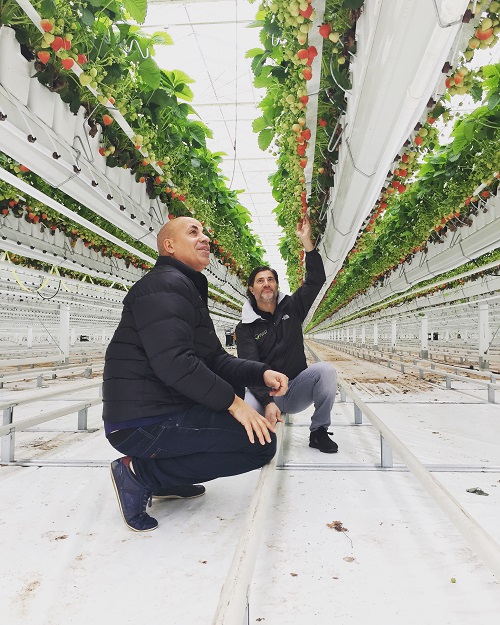
More than six decades ago, a humble journey began for two Italian brothers who immigrated to Canada with a passion to grow vibrant and delicious fruits and vegetables. Today, Tony and Gino’s children have propelled the company to unprecedented success, expanding its offerings and establishing a vertically integrated operation spanning from seed to retail.
At Mucci Farms, our commitment to local is unwavering, and is embedded into every aspect of our mission. We actively support numerous local charities and events, and also donate produce to school programs to increase access and affinity for fresh fruits and vegetables amongst young people. Our investment in cutting-edge grow light technology not only enhances local production but also ensures that our communities are supplied with fresh, quality produce year-round, overcoming the limitations of seasonal constraints. With the largest lit culture grow light program in the Canadian Controlled Environment Agriculture (CEA) industry, we take immense pride in providing sustainable employment opportunities throughout the year, helping to reshape the landscape of a traditionally seasonal sector.
Bert Mucci, CEO
Their innovative award-winning strawberries are grown in the largest controlled climate strawberry farm in North America and are available to Ontarians year-round. A major focus for the company is expanding their winter program through lit culture grow light technology to offer a wider variety of greenhouse grown items.
For 15 years, they have been proud supporters of the Foodland Ontario program, displaying the logo on many locally grown products.
Picard’s Peanuts
Picard’s Peanuts is a family-owned business with deep roots in Canada. The company first introduced peanuts to the sandy soils of Southwestern Ontario’s Norfolk County in 1979, and their passion, determination and hard work keeps them committed to growing delicious Ontario peanuts that go straight from their family farm to your family's snack bowl.
We started growing Valencia peanuts in the late 1970’s, an alternative crop to the traditional corn and soybeans. Since the beginning, we have offered locally grown peanuts to our customers, and created a wide variety of roasted peanuts and other confectionary items for over 40 years.
James Picard Jr.
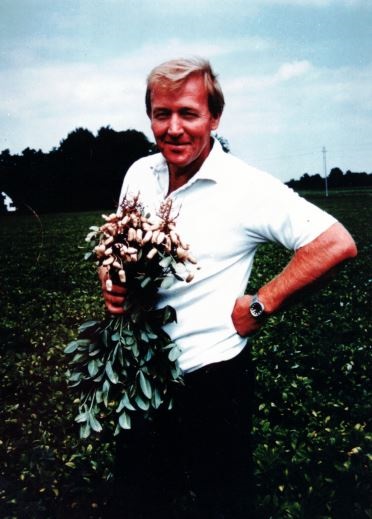
As the first family of peanut farmers in Ontario, they have been innovators from their first crop. Their Ontario grown Valencia peanuts are new to the Foodland Ontario program, and something to look forward to when visiting Picard’s retail locations in Southwestern Ontario or when shopping online. They also continually strive to research new and innovative products to expand the Picard Peanuts portfolio even further.
Belle Grove mushrooms
The Belle Grove mushrooms brand is produced on a farm in Campbellville, Ontario. They grow a wide variety of fresh, natural and tasty mushrooms for everyday recipes from white mushrooms, crimini to portobellos and dried mushrooms for extended shelf life. Over the years, they have also expanded their selection of specially sourced exotic mushrooms such as King Oyster, Shiitake and Oyster mushrooms.
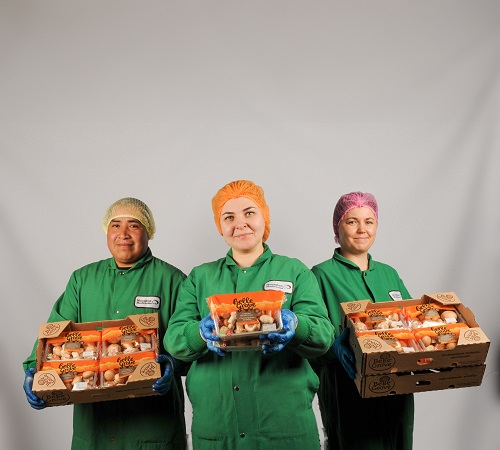
We are passionate about bringing a versatile and sustainable food to the consumer, filled with vitality to support the modern lifestyle.
George Graham, Commercial DirectorMonaghan Mushrooms
By embracing local sourcing, Belle Grove celebrates the unique flavours and characteristics of Ontario, fostering a sense of connection to the land and the people who cultivate it.
Local food literacy success stories
Moose Cree First Nation
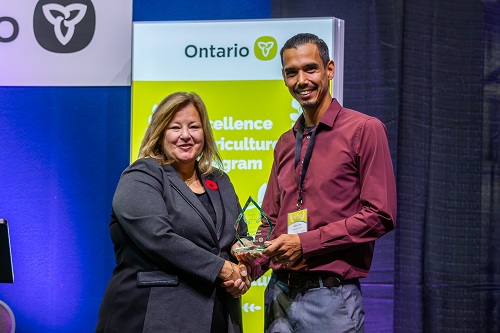
The Moose Cree First Nation located on the west side of James Bay in Ontario, received the Indigenous Owned Business or Community Excellence Award in last year’s Excellence in Agriculture Program. Their community garden project started in March 2019 with two gardens and has grown into 21 plots of land that supports over 40 families in the Moose Factory community.
In partnership with the University of Ottawa and Lakehead University, the Moose Cree First Nation has reintroduced gardening programs that focus on gardening techniques, distributing seeds, gardening supplies, and has established community gardens that help teach community members how to grow their own food while incorporating traditional knowledge and practices into gardening activities.
This initiative is all about empowering people, strengthening community bonds, and ensuring that everyone can access healthy, fresh food close to home. It’s been amazing to see the positive impact it’s had to date, and I’m excited to see our young people learn about agriculture at our planned greenhouses. Through our collective efforts, we’re healing with the land and ensuring we have a system that can sustain us for years to come.
Anthony Chum
In addition to supporting traditional food harvesting efforts, there are also plans for a greenhouse project with the local schools. The Moose Cree First Nation aims to launch these semi-permanent greenhouses in 2024 as a pilot project starting at one of the local schools. Through these collaborative and community building efforts, the Moose Cree First Nation and its university partners display a collective spirit in building sustainable and resilient food systems within Indigenous communities in Ontario.
Seneca Polytechnic
Seneca Polytechnic’s Toronto Urban Farmer Training (TUFT) program received honourable mention in the Excellence in Agri-Food Education category of the 2023 Excellence in Agriculture Program for promoting urban agriculture as a business creation opportunity within Toronto.
By focusing on community engagement, environmental sustainability, and finding alternative ways to grow plants and raise animals as a viable enterprise in an urban setting, this 10-week, online educational program drives a passion for urban farming through instruction on community gardening, rooftop farming, and repurposing of vacant lots within the city.

I’m thrilled that our program received recognition through the Excellence in Agriculture Awards,” said Andrew Paton, TUFT Research Manager, who helped get the initiative running as a Seneca Applied Research project. “We have received positive feedback and to see the Ontario Ministry of Agriculture, Food and Rural Affairs giving urban farming training an award is a boost to the whole sector.
Making use of urban spaces for farming encourages residents to cultivate their own food while fostering a deeper connection to their environment. Through agricultural education programs like this, Ontario is celebrating innovative ways that people in all areas of the province can farm.
Improving local food access
Growing opportunities for people to find and buy local food is a crucial step in achieving the goals outlined in the Grow Ontario Strategy — and that means getting more eyes on Ontario-grown products.
Leading by example
The Foodland Ontario Retailer Awards celebrate the dedication and creativity expressed by grocery stores across the province for their unique and innovative displays that promote locally grown food. For more than 35 years, retailers have entered their display photos of fresh grown and in-season fruits and vegetables. This annual program continues to be the produce industry’s premier competition that recognizes the efforts made by grocery retailers to raise consumer awareness about the diversity of foods locally grown and harvested in the province of Ontario.
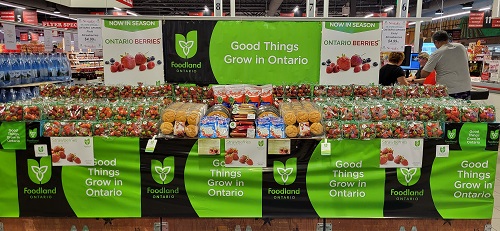
The 2023 program received more than 4,500 local display photos to support over 1,680 entries, enabling Foodland Ontario to award 60 stores across the province for their work in highlighting all the good things that grow in Ontario.
By participating in the Foodland Ontario Retailer Award program, grocery retailers are raising customer awareness for what is available seasonally so that they can know and choose what is grown right here at home. The 2023 Foodland Ontario Retailer Awards will be announced starting during this year’s Local Food Week.
The Grow Ontario Market Initiative is a $12 million joint investment by the governments of Ontario and Canada, through the Sustainable Canadian Agricultural Partnership (Sustainable CAP). The initiative provides primary producers, food processors and industry organizations with cost-share funding to help them increase sales in domestic and foreign markets through market analysis and planning, new product development and marketing. This is the first year of this five-year program and this initiative is already making a difference for Ontario agriculture and food businesses who want to grow their domestic and export market opportunities, strengthening both their business and the province’s economy.
Turkey Farmers of Ontario
Through the Grassroots Growth Program, the Turkey Farmers of Ontario received $100,000 to raise awareness for local turkey products in grocery stores and their 'Taste Turkey' retail promotion campaign. Through in-store advertising and sampling, grocery delivery service sampling, and promotional materials, the retail campaign built on their consumer-facing website that provides cooking tips and recipes for Ontario turkey.
With this support from the government we were able to promote local Ontario turkey products directly to consumers. We wanted to ensure that Ontario consumers know the variety of turkey products are available to them at retailers across the province. We’re pleased with the results achieved and continue to promote purchase of turkey year-round.
Jon-Michael Falconer, General ManagerTurkey Farmers of Ontario

Turkey Farmers of Ontario was able to reach millions of consumers across Ontario through digital and social media activities. Over 17,000 turkey product samples were distributed at grocery stores and large-scale events resulting in over 4 million impressions for the campaign from March to October.
Walkabout Farm
Walkabout Farm received an Honourable Mention in the Northern Business Excellence category of the 2023 Excellence in Agriculture Program for their significant contributions to Ontario agriculture.
Opened in 2011, the farm quickly became known for primarily lamb and pork production. In 2018, they expanded their operations to include milking sheep and then partnered with Thunder Oak Cheese Farm to produce a variety of cheeses, including a local feta-style option.
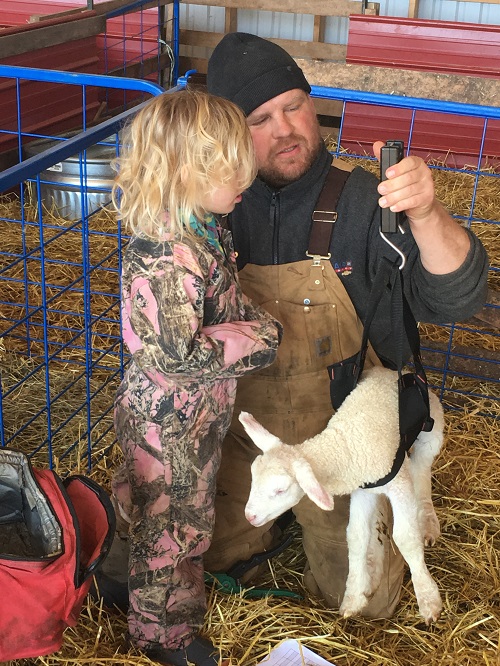
Having grown up involved in agriculture we were passionate to continue that tradition with our own family. It has been an exciting journey to expand our production and be able to provide new and unique products to Northern Ontario.
Janice GroenheideWalkabout Farm
In 2020 they expanded again by building a milk processing plant on the farm, which enabled them to provide local stores and restaurants with sheep milk cheese and ice cream products. They also increased online orders.
Expanding access to local food in the broader public sector
In the Local Food Act, the Ontario government laid out its commitment to expand local food options across the Broader Public Sector (BPS), which includes schools, daycares, hospitals and long-term care facilities. Ontario continues to remove barriers and open doors to encourage more local options on daily menus.
Leading by example
Building Ontario Business Initiative
Building Ontario Businesses Initiative (BOBI) is part of the Ontario government’s commitment to supporting businesses. BOBI aims to reduce barriers and provide companies in Ontario with greater access to public procurement opportunities, helping them to sell more goods and services, create jobs in their local communities, and promote economic growth.
The Building Ontario Businesses Initiative Act, 2022 (BOBIA), proclaimed on January 1, 2024, leverages Ontario’s purchasing power to deliver better value for taxpayers. A new regulation under BOBIA which came into effect on April 1, 2024 supports a strategy under BOBI and requires public sector buyers — including hospitals, schools, colleges and universities — to give preference to Ontario businesses under specific thresholds when conducting procurements for goods and services, such as acquiring food for cafeterias.
When a public sector entity procures a good or service under the thresholds specified in the regulation, it can use one of two methods to give preference to Ontario businesses. The public sector entity can:
- limit participation in procurement processes to only Ontario businesses, or
- give a 10% evaluation advantage to Ontario businesses if the procurement opportunity is not limited to Ontario businesses
By enabling greater access to procurement opportunities for Ontario businesses, the government is ensuring a strong domestic market and a resilient supply chain for Ontario. The government has set a target goal of $3 billion to be spent on contracts awarded to Ontario businesses through to 2026.
We also partner with commodity groups who work with schools to bring more local food into their communities.
Fresh from the Farm
Fresh from the Farm is led by the Ontario Fruit and Vegetable Growers Association and supported by the Ministries of Education and Agriculture, Food and Rural Affairs. With a decade of experience in encouraging schools to fundraise by selling bundles of Ontario fruits and vegetables, Fresh from the Farm saw almost 350 schools running a campaign in 2023.
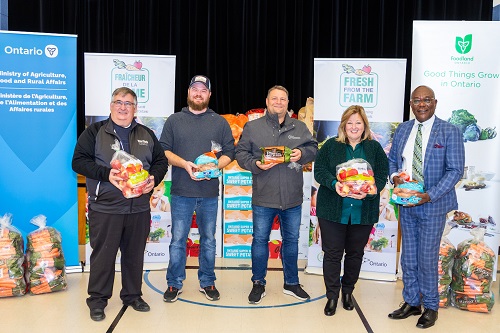
The Ontario Fruit and Vegetable Growers’ Association has been a partner with the Ontario government in delivering the Fresh from the Farm school fundraising program since 2013. It is a great example of how collaboration and strong partnerships between the private and public sectors can achieve positive results for both government, industry and Ontario consumers.
Shawn Brenn, ChairOntario Fruit and Vegetable Growers’ Association
Collectively, these schools sold over 28,000 bundles, equating to almost $650,000 in local food sales. Schools retained over $250,000 to invest into school-based activities. Since the program began, it has generated well over $5 million in local food sales for Ontario growers, co-packers and distributors.
Broader public sector successes
Don Mills Collegiate Institute
Dan Kunanec, a 23-year veteran teacher at Don Mills Collegiate Institute in Toronto, has developed an innovative program that focuses on agriculture, technological design, hospitality and tourism.
His classes go beyond traditional teaching and use a hands-on, practical learning approach that helps students connect with and learn about a variety of farming practices, from aquaponics to mushroom farming to Indigenous growing practices.
Through this approach, students develop a deep understanding of sustainable agriculture within an urban environment. They have created a greenhouse, an urban farm, an outdoor kitchen, vineyards, an orchard, and a Haudenosaunee mound garden on the school grounds. The students have created numerous outdoor tables and chairs, enough for 400 students across the school yard.
Dan says, “Our performance measures are not based on the amount of produce, but on the number of students that choose these courses. For example, our numbers have doubled from 6 classes to 12 next year. Our production is based upon a living lab concept. We are not driven by profit. Because of this, we are free to improve based upon the skills and knowledge our students learn from partners, the foundation of the past and the needed innovation of the future. As a result, the production is better each year in quantity and quality.”
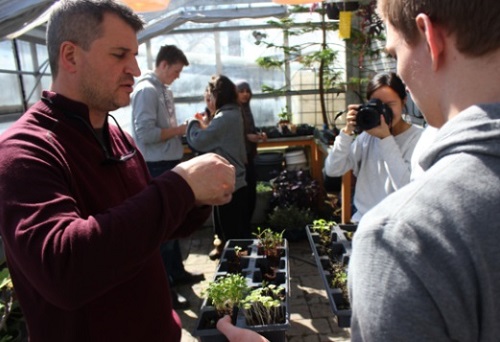
Students in an urban centre can often be disconnected to the realities of how their food is produced or where it comes from. The understanding of fresh and seasonal is interrupted by what is available in the grocery store year-round, from sources that are not local. The craft and care of planting and raising fresh produce from seed to table is a significant experience that opens minds. The concept of a 100 kilometre diet is reduced to metres at Don Mills C.I. These young city builders of the future will always remember the impact of these simple, yet powerful experiences.
Dan Kunanec, teacherDon Mills Collegiate Institute
The produce grown and products made are sold, with the proceeds benefiting the school and the local community. In the Green Industries, Hospitality & Tech Design program, students gain valuable experience in designing and maintaining sustainable urban agriculture. Kunanec’s leadership has established Don Mills Collegiate Institute as a leader in urban agriculture, while inspiring the community through local food and products.
Courses like this help to introduce young people to the wide variety of careers available in the agriculture and food sector.
St. Joseph’s Health Care London
The Food and Nutrition Services (FNS) team at St. Joseph’s Health Care London (St. Joseph’s) was one of seven organizations selected to participate in the Nourish two-year 2021–2023 Anchor Cohort program.
Nourish is a national initiative working to make good, healthy food the cornerstone of a more sustainable, equitable, and preventative health care system. The Anchor Cohort program aims to improve health equity, climate action, and community well-being.
The FNS team set goals to reduce packaging, increase composting and redirect food surpluses. They are also testing on-site food growing opportunities to supply food or fresh produce for patients and residents’ meals, while actively transitioning to a model with more localized procurement that benefits Ontario farmers.
A key initiative within this program is an innovative procurement strategy to source local food. Through issuing a Request for Information through the Ontario Tenders Portal, hospitals can prompt interest from local farmers and businesses in supplying produce. This strategic shift away from conventional food distributors, who primarily offer frozen or pre-packaged goods with some local fresh produce, aims to create interest from Ontario farmers and businesses while identifying potential challenges in sourcing local food.
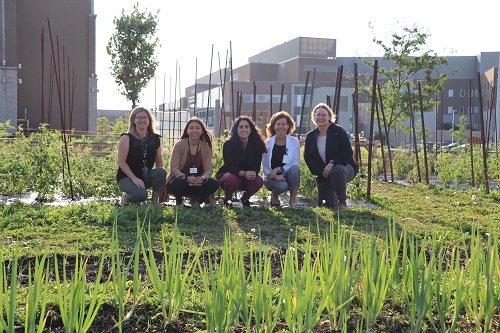
We’re looking to build a connection with our local producers and farmers to try and be able to get more of our produce from those who are right around us in the community,” said Lindsay Botnick, St. Joseph’s Director of Food and Nutrition Services. “By doing it this way, we’re doing our best to reach some of those growers and farmers that maybe haven’t always had that connection with hospitals but are just down the road from us.
St. Joseph’s continues to support sustainability efforts and strengthen Ontario communities by using local food. The team is dedicated to improving the hospital’s menu by incorporating more local food options and by establishing long-term partnerships to promote sustainability in the health care sector.
St. Joseph’s procurement team will continue this work during the next 2023–2025 Anchor Cohort program.
Growing future success through innovation
Research, innovation and new technologies are propelling Ontario’s agriculture and food industry forward. That’s why the government is prioritizing made-in-Ontario research and innovation projects that boost productivity, help businesses grow, create jobs and strengthen the economy.
Escarpment Labs
Ontario’s craft breweries are winning international awards for their unique blends of yeast, hops and other specialized ingredients. Funded through the Sustainable CAP’s Ontario Agri-food Research Initiative (OAFRI) Commercialization stream delivered by Bioenterprise Corporation, Escarpment Labs received just over $96,000 to develop innovative technologies that will dramatically reduce custom yeast development costs.
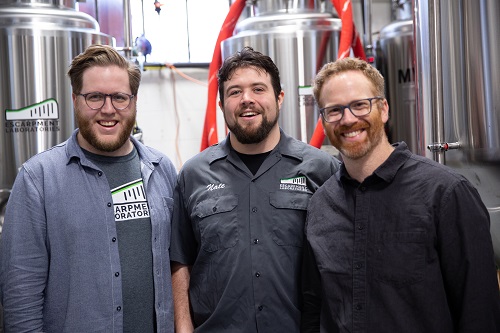
The OAFRI program enabled us to accelerate our development of new customized yeast strains, developed based on craft brewery feedback. These yeast strains are now entering the market and making an impact on the flavours and efficiencies available to craft brewers in Canada and beyond.
Richard Preiss, Co-FounderEscarpment Labs
This project supports smaller craft brewers because historically, custom yeast development has been inaccessible because of the high development costs. These unique yeast strains allow for additional flavors and a faster brew time. As the Canadian craft beer industry grows, breweries need a reliable yeast from domestic sources. Escarpment Labs works with their customers to develop a yeast that fits their needs, whether that be for flavor or economics.
Growcer
Making fresh, local produce accessible to people, regardless of climate or location, was the seed from which The Growcer’s research project Osiris 2.0 grew from. Alida Burke and Corey Ellis, co-founders of Growcer, focused on building a modular vertical farm to enable communities, retailers and organizations anywhere in the province and the country to access fresh, locally grown produce, all year round.
We realized there are many people who want to grow local food but don’t know where to start. That’s where we come in. This funding enabled us to create and test a turn-key modular farm that anyone can use to grow fresh greens year-round. The project supported by OMAFRA allowed us to improve the overall efficiency, productivity, and reliability of our Canadian-made technology.
Corey Ellis, CEO and co-founder
This research project received $150,000 through an investment by the governments of Canada and Ontario through the Canadian Agricultural Partnership’s Ontario Agri-food Research Initiative (OAFRI) Commercialization stream delivered by Bioenterprise Corporation to test their prototype farm.
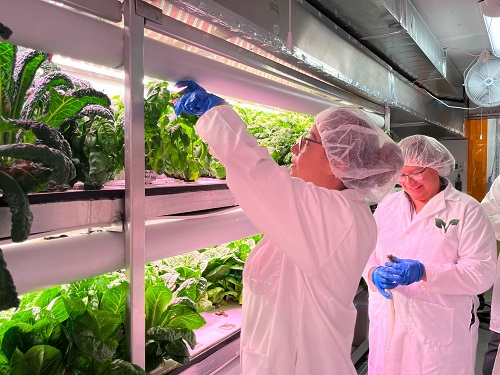
The funding was integral to making this type of farm technology more accessible whether people had agriculture backgrounds or not. Then to see the impact individuals have on their communities by growing food — and to be a small part of it — is incredibly rewarding.
Alida Burke, CFO and co-founder
The findings from the project led to the development of Growcer’s leading product, the Osiris Modular Farm. The Osiris farm is more efficient, reliable, and easier to use for growers and has been deployed in a dozen locations in Ontario and more than 80 across Canada. Passionate entrepreneurs, schools, businesses, and First Nations use the farms to grow fresh produce year-round whether it’s in a northern remote community or in the parking lot of a grocery store.
University of Guelph
While Ontario doesn’t grow coffee, it is integrated with a global business that has a link to local innovation. Researchers supported by University of Guelph’s Ontario Agri-Food Innovation Alliance programming received $100,000 to develop reasonably priced compostable materials that could be alternatives to the current coffee packaging, which relies on petroleum-based plastics and aluminum foil to preserve the freshness of coffee.
There’s a huge demand for a product like this as a suitable alternative to address sustainability with materials which are high-performance and cost-effective, while providing environmental benefits of reducing landfilling and greenhouse gas emissions.
This an exciting project where the technology we have been developing over the years is being specifically adopted to meet the high barrier demands for packaging by the coffee industry. I am delighted to work with Club Coffee and Competitive Green Technologies to develop this technology in Ontario, which could be applied globally.
Dr. Manjusri Misra, PhD, FAIChE; FSPE; FRSC (UK), professor and Canada research chair in sustainable biocompositesUniversity of Guelph

The first year of a three-year project is yielding promising results. New materials have been successfully developed which show good mechanical and gas barrier properties. In the remaining two years, the research team will test the production of the alternative materials using existing manufacturing facilities in industrial settings and evaluate the compostability. This project is a collaboration between the University of Guelph, Club Coffee, Competitive Green Technologies and their partners.
Innovation spotlight
Conestoga Food Research and Innovation Lab at Conestoga College (CFRIL) won the 2023 Minister's Award of Excellence and the Excellence in Research and Innovation award in the Excellence in Agriculture Program. The CFRIL partners with small and medium sized food businesses to provide innovative solutions and support throughout the product development cycle, including formula development, shelf-life studies, and packaging testing. They also help businesses scale up their operations through pilot plant services.
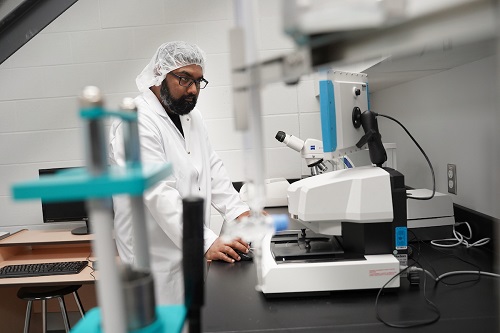
Conestoga Food Research & Innovation Lab is focused on assisting food businesses across Ontario realize their commercialization goals. We’re very proud of the recognition by Minister Thompson of the important role applied research plays to strengthen Ontario’s agriculture and food sector,” said Nicole Detlor, Director, CFRIL. “Through this program, the Government of Ontario is demonstrating their appreciation for the hardworking people and organizations within this industry.
With more than 50 partners engaged over five years and $1.75 million in projects funded, the CFRIL continues to strengthen Ontario’s agriculture and food sector by helping small and medium size businesses solve problems, enter new markets, and grow their businesses.
Summary
The future of agriculture and food in Ontario is bright because the government is working in collaboration with farmers, food processors, researchers, distributors, consumers and everyone across the agriculture and food supply chain to develop new technologies and find innovative solutions that enable the industry to reach its full potential.
The food system is often described as “from farm to fork.” That phrase recognizes that food originates at a farm. Ontario is very fortunate to be home to 48,000 farms, where farmers work hard 365 days a year to produce some of the best food on the planet. That is why during this year’s Local Food Week we are focusing on celebrating Ontario’s farmers, without whom we wouldn’t have the great selection of healthy, tasty, local food products to feed our families.